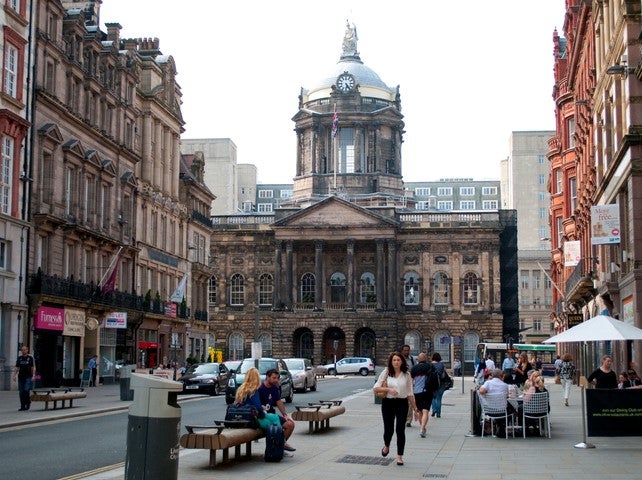‘It could get like the Eighties’: Day one of Liverpool lockdown as fears of economic collapse grow
In a city normally so buoyant, Colin Drury finds its citizens exasperated, fearful and angry with new restrictions they fear will devastate region


Your support helps us to tell the story
From reproductive rights to climate change to Big Tech, The Independent is on the ground when the story is developing. Whether it's investigating the financials of Elon Musk's pro-Trump PAC or producing our latest documentary, 'The A Word', which shines a light on the American women fighting for reproductive rights, we know how important it is to parse out the facts from the messaging.
At such a critical moment in US history, we need reporters on the ground. Your donation allows us to keep sending journalists to speak to both sides of the story.
The Independent is trusted by Americans across the entire political spectrum. And unlike many other quality news outlets, we choose not to lock Americans out of our reporting and analysis with paywalls. We believe quality journalism should be available to everyone, paid for by those who can afford it.
Your support makes all the difference.It was a tweet which was short, sharp and seething with fury.
“I don’t want to go on the news,” wrote celebrity restaurateur Gary Usher on Monday after it was confirmed the Liverpool city region, home to two of his six bistros, was to be locked down again. “If you want a quote, though: we’re f***ed.”
On Wednesday afternoon, it was a line that captured not only the anger pulsing through this city but, more pertinently perhaps, the sense that this was all so utterly avoidable; that a summer of mismanagement in Whitehall was about to wreak economic devastation here, some 200 miles away.
“In March, there was suffering because of an unknown pandemic,” one local business owner notes. “Now we’re suffering because of incompetence.”
Time and again, in conversation with The Independent, people here raise the failures of test and trace; the lack of preparation for 70,000 students landing back in the city; and the wisdom (or lack thereof) of Rishi Sunak’s Eat Out to Help Out scheme.
“They were literally paying people to crowd into restaurants,” notes Sarah Lovelock, owner of the Lovelocks coffee shop in the Old Haymarket area. “It was like a food festival every night. They basically paid people to spread the virus.”
Under the new rules – introduced after the city was placed in the toughest bracket of the government’s new three-tier coronavirus control system – people here have been banned from socialising outside their household, while pubs, gyms, betting shops and casinos have had to close. Restaurants can stay open, although with such tightened Covid restrictions, concerns remain about their viability.
Yet, while there seems to be a general acceptance that some measures are now needed to protect health here – Covid rates have surged to 635 per 100,000 of population and intensive care beds here are now 95 per cent occupied – there are also visceral fears that the cure being imposed from London will lead to an economic collapse that devastates the region for years to come.
That’s because, in a city with 1,200 licensed premises and a night-time economy estimated to be worth £5bn a year, such a shutdown is not done in isolation. It will, so the prediction goes, affect everything.
“I’m old enough to remember the Eighties,” John Hughes, boss at the Liverpool Nightlife community interest company, says while sat in the famed Concert Square. “I can’t allow myself to believe it will be as bad as that but it won’t be far off. That’s where we’re heading.
“You take £5bn off a local economy even for four weeks – and I’m hearing it will be at least eight – and it hits everyone one way or another, from the local bus services to Sheila doing haircuts for people going out on a weekend.”
Twenty pubs have already shut in the last fortnight alone, he says, adding: “They’ve pumped money into becoming Covid-secure, and then the government turns round and tells them they can’t open anyway – what a way to treat people."
The immediate irony of all this, perhaps, was that on Wednesday – day one of the new restrictions – the city seemed, on first impression, much as it ever does.
Shopping streets teemed with life; work at the city’s numerous construction sites continued apace; the local Wetherspoon pubs – all allowed to remain open under the restaurant exemption – were doing a good trade in what appeared to be light meals served with plenty of drinks.
But to speak to people here is to hear tales of hardship and hurt coming thick and fast: Lovelock, whose café sales halved as infection rates started surging once more; the taxi driver who had taken just £50 in a 16-hour shift; a beauty salon, which on a single Saturday last October had 42 appointments. This coming weekend, it has three.
“People come to us before big events, weddings, hen dos, nights out,” says Robyn Dunbar, co-founder of So Coco Rouge. “But no one’s having them anymore … We had our 10th anniversary not long ago. I don’t know if we’ll see our 11th at this rate."
None of the above, it’s worth adding, qualify for government support – which is pretty limited where it applies anyway – because they have not, strictly speaking, been forced to close.
“Anyone who’s not a politician could see this was going to happen,” says taxi driver Brian Sefton. “Look at a map and everywhere having problems are student cities. What did they think was going to happen when term started? There should have been a plan. Now what happens is, because the universities didn’t want to lose their money, it’s lads like us that suffer and have to deal with the mess that’s left.”
“Lads like us” include friend and fellow taxi driver Demetrios Louca.
When we speak, he’s had one fare in four hours. Can he survive on that? “No,” he says simply.
He has some savings, he says – “so I’ll be alright, I can fall back on them, but there are lads having to hand their cabs back because they can’t afford to keep them on the road. No one’s offering support for them. Their livelihood gone – like that.”
What would he do if in charge of the country? “I don’t know at this point, mate,” he says, before going deadpan. “I might have thought about trying to get this test and trace working when there was the chance.”
Even where government support has been offered – to those most directly affected by the shutdown – there is almost universal criticism here of how little it amounts to.
Steve Rotheram, the Labour metro mayor for the city region, has been especially vocal about the fact staff who lose work because of the closures will receive just two-thirds of their wage from the state. “Simply not good enough,” he says at one point, adding later: “If 80 per cent was the right benchmark [for the furlough scheme] in March, then nothing has changed.”
Some in government have suggested there is a little politics in all this.
However Boris Johnson would have approached the Liverpool outbreak, so goes this argument, people here would have found something to be incandescent about. People in Liverpool being furious at the Tories is pretty much the natural order of things.
But the anger this time goes beyond political colours, says Nick Small, himself a Labour councillor for the city’s central ward – the hardest hit in the whole region.
“You think back to March and people everywhere – including here – did have a sense of unity and were willing to comply with the government for the greater good,” he says. “But now, I’m just not sure that compliance will be so universal because people can see how badly things have been mismanaged in London.”
Such lack of compliance, indeed, is already beginning to emerge.
Video appeared online on Tuesday night of police having to disperse mass crowds dancing and chanting in Concert Square two hours before the lockdown started, while one gym owner in the Wirral has been fined £1,000 for refusing to accept the new rules and opening anyway. Nick Whitcombe, for the record, says the penalty will not deter him and he will do the same again.
Back at the Lovelocks café, owner Sarah understands that defiance.
“By shutting gyms and pubs and places like that, I think the government is trying to blame the people who use those places for infection rates when most are absolutely complying with every single safety guideline,” the 37-year-old says. “They are trying to turn people against each other by saying this set of people or that set of people are the reason your rates are going up.
“And it’s absolutely horrific for them to be doing that in this situation, to be trying to shift the blame for what everyone in Liverpool can see is their own failure to bring this under control.”

Join our commenting forum
Join thought-provoking conversations, follow other Independent readers and see their replies
Comments